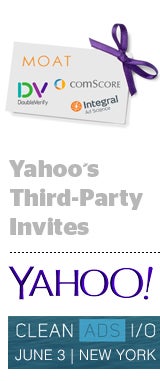Brands need to feel confident that their ads are being seen – and “because we said so” is not an acceptable answer.
That’s why Yahoo is bringing third-party verification tags from comScore, DoubleVerify, Integral Ad Science, Moat and several others onto its owned-and-operated properties and onto third-party sites within the Yahoo network.
Yahoo is slated to make its announcement at AdExchanger’s CleanAds I/O conference on Wednesday in New York City.
 It’s a move that stands in stark contrast to the position taken by two of Yahoo’s biggest competitors. Neither Facebook nor Google allow independent viewability methodologies on their platforms – and it’s impacting the bottom line. Ad Age recently reported that CPG giant Kellogg’s is dialing back its spend on Google properties, including YouTube, despite Google’s claim that its video sharing site maintains a 91% viewability rate.
It’s a move that stands in stark contrast to the position taken by two of Yahoo’s biggest competitors. Neither Facebook nor Google allow independent viewability methodologies on their platforms – and it’s impacting the bottom line. Ad Age recently reported that CPG giant Kellogg’s is dialing back its spend on Google properties, including YouTube, despite Google’s claim that its video sharing site maintains a 91% viewability rate.
“Kellogg’s reached the point where if they can’t measure it, then they can’t justify the investment,” said Dennis Buchheim, VP of product management at Yahoo, who noted that Kellogg’s is one of Yahoo’s biggest advertisers. “They need to know that their ads are being views, and unless that’s the case they don’t want to spend.”
Although it provides its own internal viewability and fraud readouts, Buchheim said Yahoo recognizes that independent verification is what’s really going to give advertisers the “confidence that they’re getting what they paid for.”
“There is no such thing as perfect measurement and it doesn’t make sense for publishers or platforms to say that they are the single source of truth, because that doesn’t allow advertisers to consistently measure across all of the platforms they work with,” he said.
In Buchheim’s view, there are several reasons why other players haven’t embraced independent third-party tags, Google and Facebook being the most conspicuous examples.
One could argue that Facebook in particular doesn’t have the same viewability vulnerabilities as other publishers because it operates within a controlled user experience, but fraud is another story.
“Facebook might have it a little easier than the rest of us right now, but they’re on the cusp of having to really figure this out, especially as they get into the Facebook Audience Network more aggressively,” Buchheim said. “Where there is an opportunity to make money, there is an opportunity for fraud, and that’s true for every single publisher and platform provider out there.”
Some publishers have cited concern that adding third-party tags would cause latency and cause loading delays, but Buchheim doesn’t buy that.
“Frankly, that is the least of our concerns given all the other tagging and pixeling that’s done in the industry,” he said.
It’s also no small feat to place and monitor all of the tracking tags. Yahoo is integrating the third-party players directly into its programmatic platforms so that advertisers can make pre-bid buying decisions.
But the biggest holdup is around control over data and over what’s happening on the platform.
“Publishers feel very proprietary, but in some ways, this is about pushing them into uncomfortable territory, toward a much needed step in the direction of accountability,” Buchheim said. “It’s an opportunity for us and I expect others will follow.”
Of course, independent verification doesn’t mean that advertisers will have homogeneous measurement across platforms. The Media Rating Council and the IAB have set standards and thresholds, but there isn’t consistency in how the measurement is actually accomplished.
“Yes, that means every single vendor, publisher and platform provider is doing something different,” Buchheim said. “But if a marketer is attracted to a particular vendor’s approach and has confidence that it’s the best one for them, we’re not going to fight that.”
Update: video added June 5.












